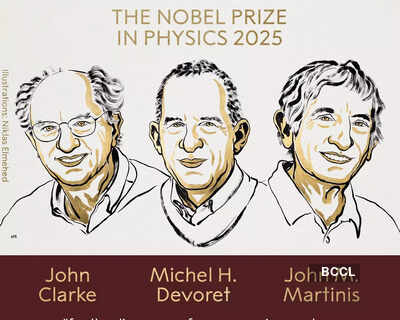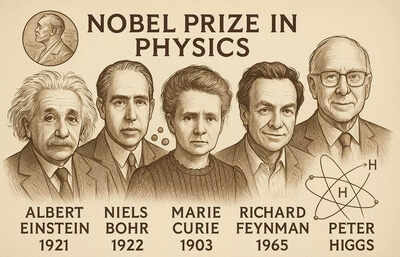Nobel Prize in Physics 2025
John Clarke, Michel Devoret, and John Martinis win the 2025 Nobel Prize in Physics for demonstrating macroscopic quantum phenomena in superconducting circuits, paving the way for quantum computing, sensors, and metrology.
Introduction
The 2025 Nobel Prize in Physics was jointly awarded to John Clarke, Michel Devoret, and John Martinis for their pioneering experiments demonstrating that quantum mechanical phenomena, traditionally confined to subatomic particles, can manifest in macroscopic superconducting circuits. Their work has significant implications for quantum computing and the broader field of quantum technologies.

What has the Nobel Prize in Physics been awarded for?
The laureates’ experiments revolved around the Josephson junction, an electrical component where two superconductors are separated by an ultrathin insulating layer. By controlling this system, they observed that a macroscopic parameter of the circuit—the phase difference—behaved like a single quantum particle. Two major phenomena were established:
-
Macroscopic Quantum Tunnelling: The system could “tunnel” through an energy barrier without the input of external energy, a behaviour previously thought impossible at macroscopic scales.
-
Discrete Energy Levels: The circuit exhibited energy quantisation, absorbing and emitting energy in fixed packets, akin to an individual atom.
These findings challenged the conventional belief that quantum effects vanish at larger scales and provided a practical pathway for designing superconducting qubits, the foundational elements of quantum computers.

Significance of the Research
Bridging the Quantum-Classical Divide: Clarke, Devoret, and Martinis demonstrated that quantum mechanics governs not only microscopic particles but also engineered macroscopic systems, provided that environmental noise is minimised. This understanding expands the scope of quantum phenomena to visible, controllable systems, bridging the gap between classical and quantum physics.
Foundation for Quantum Technologies: Their work laid the groundwork for superconducting quantum processors and circuit quantum electrodynamics (cQED), allowing scientists to read and control quantum states efficiently. These developments are central to the ongoing quest for quantum supremacy.
Transformational Applications:
-
Quantum Computers: Superconducting qubits enable computation at speeds and scales unattainable by classical computers.
-
Quantum Sensors: Extremely weak signals, such as minute magnetic fields or gravitational variations, can be detected with unprecedented precision.
-
Quantum Simulators: Artificially designed quantum systems can model complex materials and chemical reactions at the atomic level.
-
Quantum Metrology: New standards for voltage, current, and time measurement are being established using quantum principles, enhancing measurement accuracy worldwide.
Strategic Implications for India
India’s National Quantum Mission (NQM) targets the development of quantum computers and secure quantum communication technologies by 2031. The Nobel-winning research acts as a blueprint for building and controlling quantum circuits, crucial for India’s ambitions in quantum computing and national security. By integrating these principles, India can accelerate technological self-reliance in quantum science and compete in the global race for quantum supremacy.
In conclusion, the 2025 Nobel Prize in Physics underscores a paradigm shift in how scientists perceive quantum mechanics. The experiments by Clarke, Devoret, and Martinis extend the reach of quantum phenomena from the microscopic to the macroscopic realm and enable practical applications that were previously theoretical. From quantum computing and sensing to metrology, this work has laid the foundation for a technological revolution. Moreover, it provides actionable insights for countries like India to shape their quantum strategy, demonstrating the vital interplay between fundamental research and applied innovation.
Subscribe to our Youtube Channel for more Valuable Content – TheStudyias
Download the App to Subscribe to our Courses – Thestudyias
The Source’s Authority and Ownership of the Article is Claimed By THE STUDY IAS BY MANIKANT SINGH





